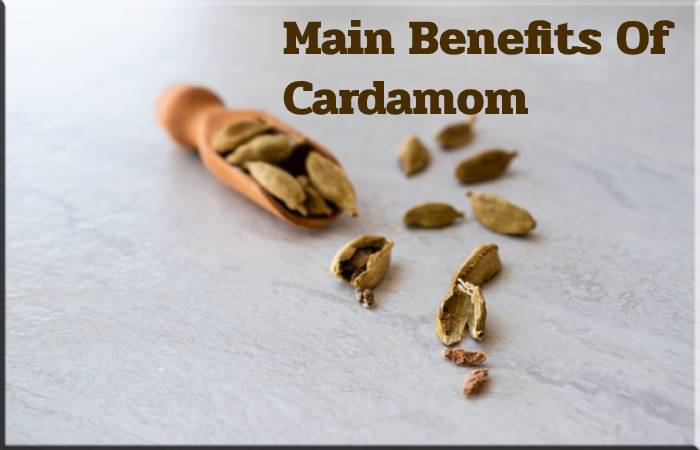Cardamom is an intense flavoring spice that often used in both sweet and savory recipes. Also, some know it for its medicinal applications. What is it for?
Cardamom’s benefits have documented for hundreds of years. However, only recently were they endorsed by some scientific research.
It is often used as a spice, as its lightly sweet flavor improves the taste of dishes. However, some also prefer it for its medicinal applications.
As detailed in an article published in Journal Medicinal & Aromatic Plants, this ingredient originated in India and has used in traditional medicine for centuries.
It is even one of the most popular flavoring agents in both culinary and cosmetics. Do you want to know more about it? Below, we detail its benefits.
Table of Contents
Main Benefits Of Cardamom

Cardamom seeds and essential oil have interesting medicinal applications. Although they are not a first-line treatment for diseases, they appear to be an adjunct to promoting well-being. Of course, as long as they included in the framework of a healthy diet.
According to a chapter in the book Nuts and Seeds in Health and Disease Prevention, this spice has anti-inflammatory, antioxidant, and antimicrobial properties that explain its health effects.
Furthermore, it is safe for most people and can include in many daily preparations. What is it for?
Helps Regulate Blood Pressure
Patients with high blood pressure can benefit from consuming cardamom.
According to a study published in the Indian Journal of Biochemistry and Biophysics, cardamom (Elettaria cardamomum L) contributes to reducing high blood pressure in patients with primary hypertension.
Also, it increases fibrinolysis and improves the antioxidant state.
It is not entirely clear why spice can have this health effect. However, researchers suspect it is due to a slight diuretic effect, stimulates the elimination of liquids retained in the body and risk factors for hypertension.
Cardamom could be a regulator of blood pressure that contributes to the treatment of hypertensive patients.
Protects From Chronic Diseases
Due to its anti-inflammatory properties, cardamom lowers the risk of chronic non-communicable diseases, such as those that fall into metabolic syndrome.
Although the state of inflammation is necessary to some extent, in the long term, it can trigger serious health problems.
However, as detailed in research in the medical journal Biomedicine & Pharmacotherapy, cardamom contains polyphenol, flavonoid, and terpenoid compounds that help cope with inflammation.
Specifically, a dose of 50 to 100 mg per kg of weight was able to inhibit about four inflammatory compounds in studies in rats.
Contributes To Digestive Health
One of the most prominent benefits of cardamom has to do with digestive health. There is evidence to suggest that combining it with other medicinal spices can calm common symptoms such as nausea and vomiting. Also, it believed to help against ulcers.
In an animal study published through the Asian Pacific Journal of Tropical Biomedicine, cardamom extracts combined with other spices helped reduce ulcer formation.
Additionally, test tube studies suggest that it may protect against Helicobacter pylori, a leading cause of ulcers and digestive problems.
Help Take Care Of Oral Health
One of the traditional uses of cardamom has to do with oral health. It is an ingredient that is still used to combat bad breath and in the manufacture of chewing gum for the same purpose.
A study published in Dental Research Journal highlights that this spice is effective against oral pathogenic bacteria such as Streptococcus mutans and Candida albicans.
Also, a 2009 study found that, in test tube cases, cardamom extracts helped fight five bacteria that cause oral cavities. Specifically, they were effective in inhibiting their growth. However, more research is still needed to verify these effects in humans.
Cardamom has one of its classic applications in the fight against bad breath.
2Other Benefits Of Cardamom
Cardamom used in aromatherapy may help improve breathing and airflow to the lungs during exercise, according to the results of a shared study in the Journal of Health and Allied Science.
The extract obtained from this spice appears to help reduce elevated levels of liver enzymes, triglycerides, and cholesterol, as some studies point out.
Thanks to its concentration of antioxidants, cardamom also has positive effects on controlling anxious behaviors.
Is It Safe To Consume Cardamom?
To date, there are no data on possible adverse effects of the consumption of cardamom. In healthy adults, it considered safe, although it is advisable to moderate its intake.
Besides, it not recommended for children, pregnant or lactating women, as there is no data on its safety at these stages.
The best way to reap the benefits of the spice is to add it naturally to meals. While supplements are available, they not regulated by the Food and Drug Administration. Therefore, they took it with caution.
